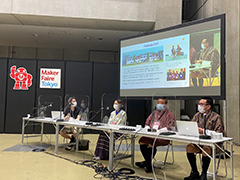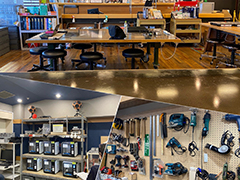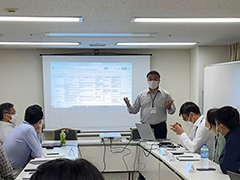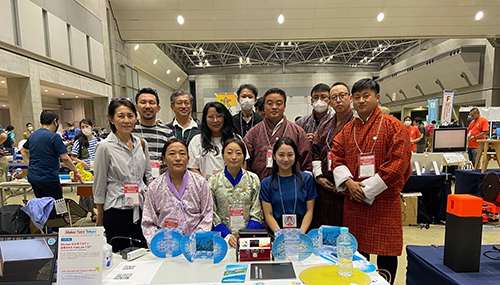- Home
- About JICA
- Organization
- Domestic Offices
- Yokohama Center
- Topics & Events
- [In the Eyes of an Intern] Bhutan CST FabLab Program - Fabrication for the Future -
Topics & Events
September 16, 2022
[In the Eyes of an Intern] Bhutan CST FabLab Program - Fabrication for the Future -
(August 31st to September 16th, 2022)
 Mr. Tashi (far right) presenting on the CST FabLab at Maker Faire Tokyo 2022.
Mr. Tashi (far right) presenting on the CST FabLab at Maker Faire Tokyo 2022.
"More weaknesses mean more solutions,"
says Mr. Tashi with a smile. He is the Dean of Academic Affairs at the Royal University of Bhutan College of Science and Technology (CST). The In-Japan Knowledge Co-Creation Programs (KCCP) finally resumed this August after being suspended for two and a half years due to the pandemic. Amidst the humid Japanese heat of late summer, 8 participants arrived from Bhutan.
On August 25th, just before the Bhutanese delegation arrived in Japan, "CST FabLab" was inaugurated on the CST campus in a town called Phuentsholing in the south of Bhutan. The overarching theme of this program is the sustainable growth of the newborn FabLab.
 DMM.make AKIBA provides a coworking space for fabrication in Akihabara. Worktables are provided, and 3D printers line the walls.
DMM.make AKIBA provides a coworking space for fabrication in Akihabara. Worktables are provided, and 3D printers line the walls.
So what exactly is a "FabLab"?
A FabLab is a space set up to encourage open innovation by providing access to advanced digital manufacturing technology (such as 3D printers and laser-cutters), inspiring people to turn their ideas into new products or prototypes.
Embraced by the Himalayas between two giants, India and China, is the Kingdom of Bhutan. It is known for its philosophy centered around GNH (Gross National Happiness) and, in recent years, has made astounding progress in reduction of extreme poverty and promotion of gender equality. However, as a landlocked mountainous country with a population of just 700,000, it holds many "weaknesses," as per Mr. Tashi's opening words, from small domestic market to high transport cost.
Much of the population relies on agriculture for their livelihood, and the economy leans on industries such as export of hydropower and tourism, depending on external demand. Elevated unemployment rate of urban youth is a symptom of the undiversified industry; young university graduates with high expertise struggle to settle into jobs as a result.
Solving these local issues is where the FabLab could play an instrumental role. Digital fabrication could unleash the creativity of individuals, and lead to the development of products and prototypes which meet the various needs of the community. This has potential to evolve into local manufacturing in the future, which could generate new jobs.
For CST FabLab to follow this path, sustainable growth will be the key.
On the final day of the program, the participants presented the following actions as the first steps of their initiative:
- Hosting workshops to nurture a creative spirit in young generations
- Opening the facility to the public to grasp the community's needs
- Revising the fee structure to ensure access for anyone and everyone
These actions could help overcome the difficulties which hinder CST FabLab's growth.
One such difficulty is financing.
CST FabLab is a non-profit space to encourage innovation, but minimum revenue is necessary to cover material and reparation costs. The balance between financing the facility and maintaining equal access to all users will become an obstacle to the FabLab's sustainable growth.
The second is immersion into the community.
No matter how much material and technology can be provided, if the creative spirit is not disseminated and people do not continuously visit CST FabLab, then innovative solutions cannot be realized.
Although CST FabLab is located in the university campus, academia alone cannot connect this initiative to solutions for local issues; cooperation with the government and the industry is essential for the FabLab to function as a focal point of fabrication. The delegation of this program consists not only of university faculty but also representatives from both the Phuentsholing municipality and the Association of Bhutanese Industries. Members gathered from across the entire community, and there were many moments where the participants exchanged passionately about their continued cooperation. There is no doubt that this network will become even stronger and bring out the best of each member of society.
 "FabLab is not about the machines; it is about the people." Mr. Tenzin (center) as he presents future prospects on the last day of the program.
"FabLab is not about the machines; it is about the people." Mr. Tenzin (center) as he presents future prospects on the last day of the program.
"FabLab is not about the machines; it is about the people," says Mr. Tenzin, lecturer at CST.
CST FabLab is a seedling which has just come to life. Watered by the newly found cooperation between academia, government, and industry, it is sure to grow into a vibrant tree which thrives with open innovation and is home to all the community.
 The participants were dressed in traditional clothing at Maker Faire Tokyo 2022.
The participants were dressed in traditional clothing at Maker Faire Tokyo 2022.
JICA Yokohama Center KCCP Division (Intern)
Tamao ISONO
- About JICA
- News & Features
- Countries & Regions
- Our Work
- Thematic Issues
- Types of Assistance
- Partnerships with Other Development Partners
- Climate Change / Environmental and Social Considerations
- Evaluations
- Compliance and Anti-corruption
- Science and Technology Cooperation on Global Issues
- Research
- JICA Development Studies Program / JICA Chair
- Support for the Acceptance of Foreign HRs / Multicultural and Inclusive Community
- Publications
- Investor Relations
